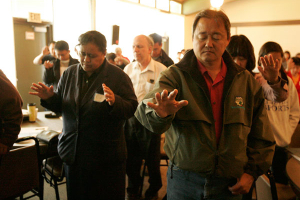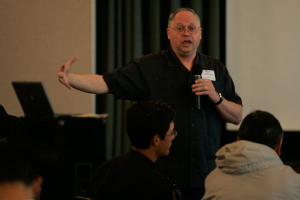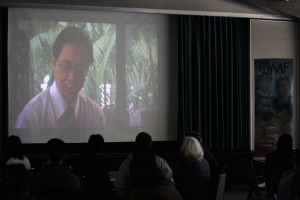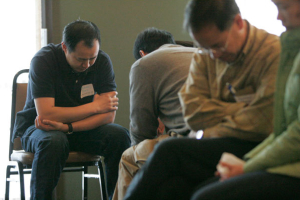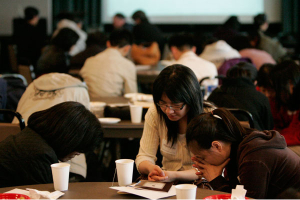On April 25, Overseas Missionary Fellowship (OMF) held their annual mission conference in Bay Area Redwood City. During the three-hour gathering, they’ve introduced the minority ethnic groups in China and South East Asia, challenging the believers to have a gospel burden for the unreached people living in the 10/40 window and to inherit the spirit of Hudson Taylor, the father of China missions.
The gathering first showed the newest released documentary made by OMF titled Breakthrough: The Story of James O Fraser and the Lisu People. Fraser was born in a wealthy family, where every member of the family was devout Methodists. Since he was young, he admired China Inland Mission (CIM) for not fund-raising, setting up the faith of self-supporting mission, so he joined CIM after his college graduation. In 1909, he stepped on the city near the western border of Yunnan Province in China, and began to preach to the local Hans Chinese. Because not many people turned to Christ, he changed his focus to the neglected Lisu people. He diligently studied Lisu language and became the first person to be able preach the Bible and hymns with the Lisu language in history. For several thousand years, the Lisu tribe has never heard of the story of Jesus’ salvation, rather most of them indulged in traditions of folk myths, even in evil spirit activities, which became Fraser’s greatest challenge as he was doing missions. Several years after his first arrival, only three families have converted to Christianity.
Fraser views prayer of paramount importance; when faced with setbacks, he often times prayed for hours and days in order to regain strength. Furthermore, he called his family, friends, and coworkers in Britain to form a large prayer team in order to pray for the Lisu people. Another special trait of Fraser was that he always followed the mission model of setting up the indigenous as the center, holding training for the Lisu believers, letting them to purchase books, build churches, and support the ministers with their own funds. These principles allowed the indigenous churches to continue to stand even after foreign missionaries were forced to leave China and have become a classic example for the church-planting among the ethnic minorities in southwestern parts of China and other countries. The history was first opened by one person and then other missionaries secured the foundation, so until the 1990s the Christians in the Lisu people consist of 90%. In addition, the Lisu’s written language invented by Fraser was recognized by the Chinese government as the official written language.
Fraser left the promising future and comfortable life and traveled to a rural mountainous area in China to preach the gospel to the neglected tribe, offering up his whole life. His fearless love in Christ won almost the entire tribe of the Lisu people. Over 100 people participated and they were first-generation and second-generation Chinese-Americans from the Chinese churches in the Bay Area. The 36 minute documentary greatly touched the participants and they formed into small groups to discuss and pray.
OMF International Director Dr. Patrick Fung shared in a video recording that there are over 400 different ethnic groups in the world, but the majority of them are unreached people who have not yet heard of the gospel, so he challenged the participants to carry the burdens of the gospel. He gave thanks for the sacrifice and life dedication of Fraser and pray asking that God can raise more people with such kind of sacrificial spirit and mature churches to preach the gospel in South East Asia.
Following was the workshop time, where participants have the opportunity to explore the mission needs in Cambodia, China, and other places. Also, OMF also introduced their BridgeAsia volunteer plan that is implemented in Bay Area, allowing the average believers to experience mission-related work in their closest vicinities.
The last section of the gathering was the testimony of a missionary couple. This couple just returned from southwestern part of China and they reported to the participants the situation of their mission field. Their mission target is Bouyei, a 3.5 million ethnic minority living mostly in the beautiful semi-tropical forest region in Guizhou and a minority of them live in Yunnan Province and Sichuan Province. Bouyei people always kept their own culture, special days and traditions, in order to preserve their ethnic identity. Bouyei view themselves as Dai ethnicity and not as Hans; their language is a branch of Dai language. The Bouyei worship mixtures of religions, including Buddhism, Taoism, Animism, Shamanism, ancestral worship and mysticism. In the early 1800s, Catholic and Protestant missionaries have tried to evangelize the Bouyei, but they changed their target group to the Hans Chinese, so there were no traces of established church. The Bouyei don’t have roads, education, and medical services. Although there are water supplies, they could not transport the drinking water to the villages, which affected their economic growth.
The two missionaries expressed that for several millenniums the Bouyei has been accustomed to worship all kinds of hand-made “gods”, and they have never heard of the story of the redemption and salvation of Jesus Christ, so the most important thing is for them to hear the gospel. Not only so, some Bouyei in the mountain areas are still very cautious towards the foreigners even until today, which makes it difficult to gain their trust, and after interacting with the missionaries, some Bouyei were harassed by the Public Security Bureau officers. Lastly, the two missionaries urged the believers to pray for the mission among Bouyei:
1) Pray that God’s Kingdom can be done among the Bouyei people and that all powers of the evil spirit can be broken.
2) Pray that God can form a global prayer team that will specifically pray for the Bouyei people.
3) Pray that the small-scale churches currently held among the Bouyei people can replicate continuously until the biblical-centered indigenous church movement is established.
4) Pray that God can protect the missionaries working among the Bouyei people and call for more workers to gather the harvest.
5) Pray that God can secure the Bouyei believers living under the pressure from family and the persecution from the government.
Luke Leung translated the article.

